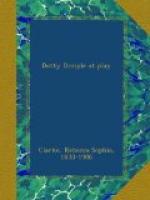Uncle Henry did not like to part with his bright little niece. She had been so docile and affectionate during her visit, that he began to think her very lovely, and to wonder he had ever supposed she had a wayward temper.
The ride to Indianapolis was a very pleasant one. Katie thought she had the care of the whole party, and her little face was full of anxiety.
“Don’t you tubble yourself, mamma,” said She; “I’ll look out the winner, and tell you when we get there.”
“Don’t let her fall out, Horace,” said Mrs. Clifford; “I have a headache, and you must watch her.”
“Has you got a headache, mamma? I’s solly. Lean ’gainst me, mamma.”
Horace wished the conductor had been in that car, so he could have seen Miss Flyaway trying to prop her mother’s head against her own morsel of a shoulder—about as secure a resting-place as a piece of thistle-down.
“When was it be dinner-time?” said she at last, growing very tired of so much care, and beginning to think “’Naplis” was a long way off.
But they arrived there at last, and found Mr. Parlin waiting for them at the depot. After they had all been refreshed by a nice dinner, and Flyaway had caught a nap, which took her about as long as it takes a fly to eat his breakfast, then Mr. Parlin suggested that they should visit the Blind Asylum.
“Is it where they make blinds?” asked Dotty.
“O, no,” replied Mr. Parlin; “it is a school where blind children are taught.”
“What is they when they is blind, uncle Eddard?”
“They don’t see, my dear.”
Flyaway shut her eyes, just to give herself an idea of their condition, and ran against Horace, who saved her from falling.
“I was velly blind, then, Hollis,” said she, “and that’s what is it.”
“I don’t see,” queried Dotty,—“I don’t see how people that can’t see can see to read; so what’s the use to go to school?”
“They read by the sense of feeling; the letters are raised,” said Mr. Parlin. “But here we are at the Institute.”
They were in the pleasantest part of the city, standing before some beautiful grounds which occupied an entire square, and were enclosed by an iron fence. In front of the building grew trees and shrubs, and on each side was a play-ground for the children.
“Why, that house has windows,” cried Dotty. “I don’t see what people want of windows when they can’t see.”
“Nor me needer,” echoed Katie. “What um wants winners, can’t see out of?”
They went up a flight of stone steps, and were met at the door by a blind waiting-girl, who ushered them into the visitors’ parlor.
“Is she blind-eyed?” whispered Flyaway, gazing at her earnestly. “Her eyes isn’t shut up; where is the see gone to?”
Mrs. Clifford sent up her card, and the superintendent, who knew her well, came down to meet her. He was also “blind-eyed,” but the children did not suspect it. They were much interested in the specimens of bead-work which were to be seen In the show-cases. Mr. Parlin bought some flowers, baskets, and other toys, to carry home to Susy and Prudy. Horace said,—




